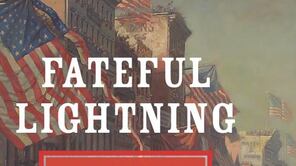Allen Guelzo's new history of the civil war, Fateful Lightning, is a masterpiece of compression.
Here, in only 576 pages, including all footnotes is the whole war, strategy as well as tactics. Guelzo reaches back to the origins of the slavery controversy in the 1820s through the end of Reconstruction in 1877. Guelzo deftly sketches the leading personalities on both sides, yet also has time to describe the sound made by a Minie ball. Through it all, his remarkably broad expertise casts unexpected light on issue after issue.
For example:
Why did Robert E. Lee order Pickett's disastrous charge? Guelzo draws attention to the lessons the soldiers of the mid-19th century drew from the Crimean War. In that war, the tactical offensive had usually prevailed, thanks to the slowness of musket fire as compared to the speed of marching professional soldiers. The experience of the first year of the Civil War seemed to validate the Crimean lesson. Until it was too late. Grant may have the reputation of a butcher, but year in, year out, it was Lee's army that suffered the higher rate of casualties.
How did the war shape American religion? On this, Guelzo, the author of a superb study of Lincoln's religious ideas, Redeemer President, has many insightful things to say. Before the war, evangelical religion overwhelmingly dominated American intellectual and moral culture, a few skeptical enclaves aside. But the men who fought the war returned with shaken faith. As one of them, the future president James Garfield would later explain, at the sight of so much slaughter, "something went out of him… that never came back; the sense of the sacredness of life and the impossibility of destroying it.”
Why did the South's cotton weapon fail to force European and especially British intervention? The Southern plantation owners, remarks Guelzo, understood very well the economics of demand, but not the economics of supply. By 1863, cotton was reaching Britain from Egypt, India, and Brazil. The South's former dominating position had been cast away forever.
Guelzo is always an original voice on the war. Yet the great value of his new civil war history comes most from its compendious synthesis of what has been thought and learned and written about the Civil War in the past 20 years: new thinking about the role of women in the wartime era, new thinking about how loss & mourning changed American religious expression in the postwar era, new thinking above all about slavery and slavery's aftermath. A whole lifetime of research and reading and reconsideration is packed into this one moderately sized volume. Here is the one best new introduction to the history of the war, in lucid and vivid language, for the person seeking to broaden their understanding beyond the story shown on the big movie screen. This is the one-volume history that ought to be on the shelf of every college history student - even as it repays the attention of those who have already read deeply in the historical literature. Fateful Lightning is a splendid accomplishment.






